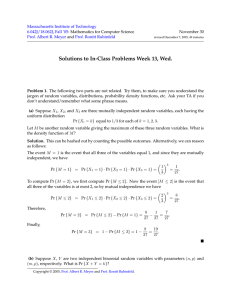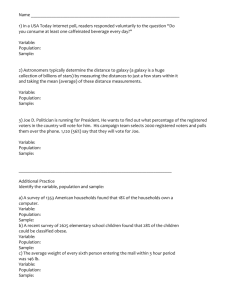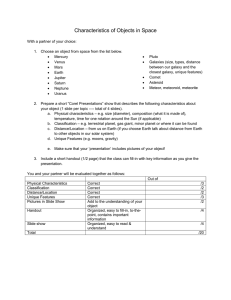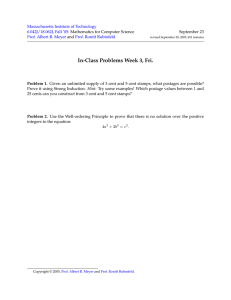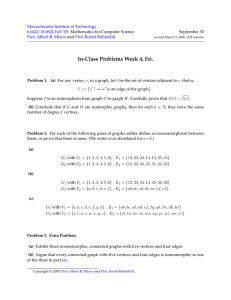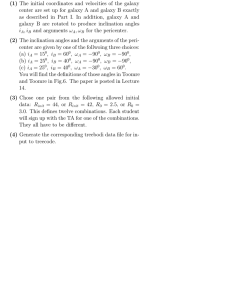Massachusetts Institute of Technology 6.042J/18.062J, Fall ’05 Prof. Albert R. Meyer
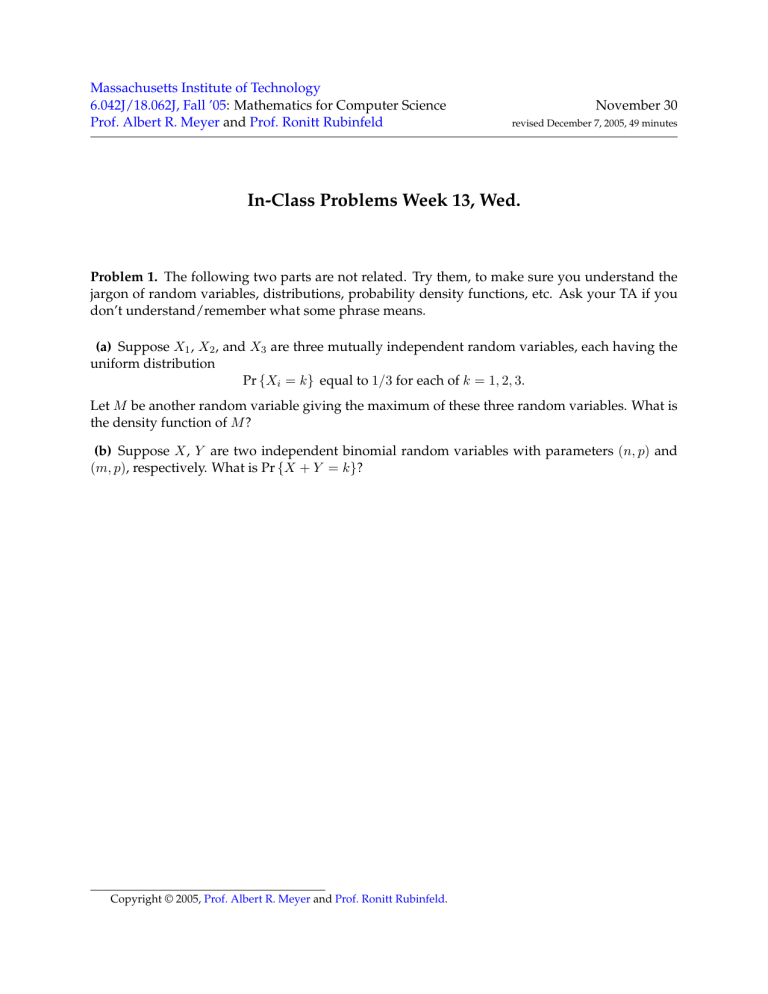
Massachusetts Institute of Technology
6.042J/18.062J, Fall ’05 : Mathematics for Computer Science
Prof.
Albert R.
Meyer and Prof.
Ronitt Rubinfeld
November 30 revised December 7, 2005, 49 minutes
InClass Problems Week 13, Wed.
Problem 1.
The following two parts are not related.
Try them, to make sure you understand the jargon of random variables, distributions, probability density functions, etc.
Ask your TA if you don’t understand/remember what some phrase means.
(a) Suppose X
1
, X
2
, and X
3 uniform distribution are
Pr { X i
= three k } mutually equal to 1 / independent
3 for each of k random
= 1 , 2 , 3 variables,
.
each having the
Let M be another random variable giving the maximum of these three random variables.
What is the density function of M ?
(b) Suppose X , Y are two independent binomial random variables with parameters ( n, p ) and
( m, p ) , respectively.
What is Pr { X + Y = k } ?
Copyright © 2005, Prof.
Albert R.
Meyer and Prof.
Ronitt Rubinfeld .
InClass Problems Week 13, Wed.
2
Problem 2.
I know everything.
Seriously.
So, I know everything that everybody thinks.
In par ticular, I know who each one of the 750 billion members of the galaxy want to vote for in the upcoming elections for the Intergalactic president.
I know that a fraction p = 0 .
52 of them want to vote for the current president.
You are mortal.
An insignificant dot in spacetime.
But a quite significant dot among dots.
You work closely to the current Intergalactic president and, within a week, you must answer his ago nizing question: “Am I winning?” Or, in math jargon (but with the same agony): “Is p > 1 / 2 ?”
Your first idea is to ask me (I know everything).
But you haven’t talked to me for a long time, so you know I won’t tell you.
Your second idea is to call every person in the galaxy, ask them, then divide the yes’s by 750 billion.
But you soon realize there is not enough time (there is a reason for representative democracy).
Your third idea.
.
.
You have no third idea!
In your panic as the week is almost over, you start picking galaxy members at random, call them, and ask!
Amazingly, that’s the correct approach.
But you should be careful what you are going to say to the president!
Let’s see.
(a) In your first phone call, you pick one galaxy member uniformly at random , call, and ask whether he/she will vote for the president.
What is the probability that the answer is going to be “yes”.
.
.
(i) from my perspective?
(ii) from your perspective?
How would you model this in terms of coin flips?
(b) In your second phone call, you again pick a galaxy member uniformly at random , call, and ask whether he/she will vote for the president.
But wait!
When selecting the second voter, shouldn’t you exclude the guy that you asked in the first phone call?
Maybe, but what complication comes from excluding him/her?
(c) So, in each one of n phone calls, you pick a galaxy member uniformly at random and ask.
Your plan is to eventually divide the number, Y , of “yes” answers by n to get P ::= Y /n .
An MIT friend tells you that, as the numerical outcome of a random experiment, this P is a random variable, and that, according to his calculations,
Pr {| P − p | ≤ 0 .
03 } ≥ 0 .
95 .
When you are done calling people, you divide to get P , and it’s 0.53.
You call the president up and.
.
.
what do you say?
(1) Mr.
President, p = 0 .
53 !
(2) Mr.
President, with probability at least 95%, p is within 0.03
of 0.53!
(3) Mr.
President, either p is within 0.03
of 0.53
or something very strange (less than 5in100) has happened.
For each statement answer: (i) Are you justified to claim it?
(ii) Is it true?
A third problem that originally appeared here has been deleted.
Few, if any, teams got to this problem; it will be postponed for a later class problem session.
